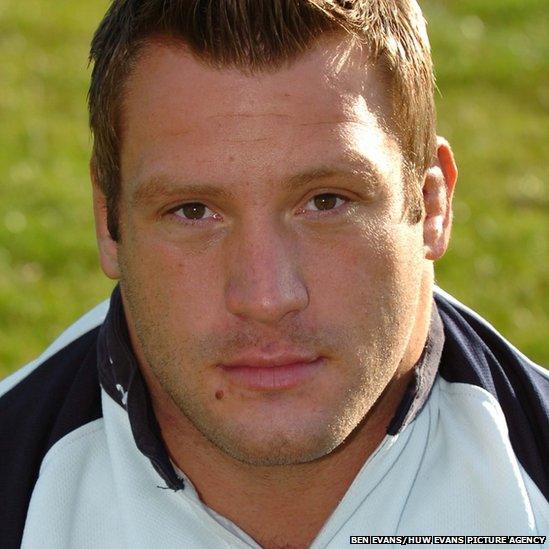Ex-rugby player Dean Colclough broke anti-doping rules, says tribunal
- Published

Dean Colclough played for Swansea RFC until the end of 2007, the tribunal was told
A former Swansea RFC player has been suspended from all sport for eight years after being found guilty of using his company to distribute steroids.
Dean Colclough, 34, stopped playing in 2007 after an injury but later ran a company in Swansea which produced and distributed muscle-building supplements.
An independent panel found Mr Colclough guilty of breaking anti-doping rules.
He had denied the charges and said he had not intended to play rugby again.
'Significant case'
UK Anti-Doping (UKAD), which brought the charges, said the eight-year ban was the largest to be handed down in the UK for a first offence.
The charges were considered by the National Anti-Doping Panel, an independent tribunal responsible for determining anti-doping disputes in sport in the UK.
UKAD's Graham Arthur said: "An independent panel has imposed a significant ban on this athlete (Mr Colclough), the largest yet to be handed down in the UK for a first offence. It is a significant case for a number of reasons.
"Firstly, it was through our strong relations with the UK Border Force that the case was first brought to our attention.
"Secondly, this finding demonstrates that everyone in sport has a responsibility to anti-doping, no matter what the level of engagement."
Mr Colclough, a former hooker, played for Welsh Premiership club Swansea RFC more than 100 times but told the tribunal he retired in December 2007 due to a neck injury.
He had registered with his local rugby club Morriston in the hope of playing again but was advised not to due to the injury.
However he was still registered as a player with the Welsh Rugby Union, the panel was told.
'Muscle mass'
In an email to the tribunal, Mr Colclough said in 16 years as a rugby union player he was "completely clean from using any form of banned product".
In 2012, Mr Colclough founded Dragon Nutrition Ltd (DNL) in Swansea which distributed muscle-building supplements.
In an email to the panel, he wrote: "I do not condone doping in sport and the products we sell are aimed at those wanting to build up their muscle mass and improve the look of their physique.
"We have a warning both on our site with the product description and on the label itself that states they should not be used by athletes in drug-tested competitions."
But the anti-doping panel found him guilty of committing anti-doping rule violations involving the possession and trafficking of steroids via DNL.
He is banned from all sport until 13 November 2021.
One of the charges related to 19-year-old Scottish player Sam Chalmers who in 2013 was banned from playing for two years for using steroids.
The tribunal had been told that Sam Chalmers, the son of former Scotland and Lions fly-half Craig Chalmers, had bought the product from Mr Colclough's company.
But the panel said it could not be "comfortably satisfied" that Mr Colclough's firm had supplied the steroids in the player's positive test.
The Welsh Rugby Union (WRU) said it took anti-doping offences very seriously, and it worked closely with those agencies involved such as UKAD.
"The WRU condemns any violation of anti-doping rules, whether committed by an athlete, coach, administrator or anyone involved in rugby at whatever level," said a spokesperson.
"The WRU has an active education programme in place with players from the senior national team through to the semi-professional tier of Welsh rugby and works to educate and raise awareness throughout the club game.
"While this case is not related to an individual currently playing rugby in Wales, the WRU urges every player to be aware of their responsibility when considering taking any kind of substance or supplement."
The UK Border Force was involved in the interception of a package at an airport.
A spokesman said: "Border Force, working with UK Anti-Doping, has helped prevent a quantity of banned anabolic steroids from being imported into the UK and used illegally in sport.
"Our officers are on constant alert to identify unlicensed, fake and illegal goods and prevent them from entering the country.
"Our methods ensure that packages containing suspect items are intercepted, and contents examined, without hindering the thousands of legitimate items imported each day."